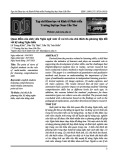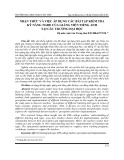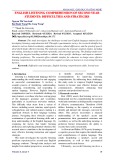
TNU Journal of Science and Technology
229(03): 237 - 242
http://jst.tnu.edu.vn 237 Email: jst@tnu.edu.vn
APPLYING PODCASTS TO ENHANCE NON-ENGLISH MAJOR FRESHMEN’S
LISTENING SKILL – A PRE-EXPERIMENTAL RESEARCH
Vu Kieu Hanh1, Vu Thi Quyen2*
1TNU - University of Agriculture and Forestry
2TNU - School of Foreign Languages
ARTICLE INFO
ABSTRACT
Received:
31/01/2024
The study aimed to assess the effectiveness of English podcasts in
improving listening skills for non-English major students and measure
their satisfaction with podcasts as a listening resource. Twenty-eight
participants, including nine males and nineteen females, were randomly
assigned to either a control group or an experimental group. The control
group were instructed to spend at least one hour listening to English
content from sources of their choice, while the experimental group were
tasked with listening to an English podcast at lease two times. Students
in both groups were provided with a listening worksheet after every two
lessons. Additionally, participants underwent a pre-test and post-test to
measure their progress over the duration of the experiment. To gauge the
experimental group's satisfaction with the use of podcasts in the research,
a questionnaire was administered. The data collected from various
instruments revealed that non-English major students experienced
improvements in their listening skills through the incorporation of
podcasts and exhibited a positive attitude towards the utilization of
English podcasts in learning English.
Revised:
22/3/2024
Published:
22/3/2024
KEYWORDS
Podcasts
Listening skill
Extensive listening
Learner satisfaction
Learner autonomy
SỬ DỤNG PODCAST NHẰM NÂNG CAO KHẢ NĂNG NGHE TIẾNG ANH
CHO SINH VIÊN KHÔNG CHUYÊN - NGHIÊN CỨU TIỀN THỰC NGHIỆM
Vũ Kiều Hạnh1, Vũ Thị Quyên2*
1Trường Đại học Nông Lâm - ĐH Thái Nguyên
2Trường Ngoại ngữ - ĐH Thái Nguyên
THÔNG TIN BÀI BÁO
TÓM TẮT
Ngày nhận bài:
31/01/2024
Nghiên cứu nhằm đánh giá hiệu quả của podcast tiếng Anh trong việc cải
thiện kỹ năng nghe cho sinh viên không chuyên ngành tiếng Anh và đo
lường sự hài lòng của họ với nguồn tài nguyên này. Hai mươi tám sinh
viên, bao gồm chín nam và mười chín nữ, đã được phân ngẫu nhiên vào
hai nhóm đối chứng và nhóm thực nghiệm. Trong nhóm đối chứng, sinh
viên được hướng dẫn dành ít nhất một giờ mỗi tuần để nghe tiếng Anh
các nguồn tài liệu bất kỳ, trong khi nhóm thực nghiệm được yêu cầu nghe
một podcast tiếng Anh ít nhất hai lần. Sau mỗi tuần học, sinh viên làm
bài tập trong phiếu bài tập nghe với nội dung liên quan đến chủ đề đã học
trong tuần trước. Ngoài ra, sinh viên cũng hoàn thành hai bài kiểm tra
đầu vào và bài kiểm tra kết thúc khoá học để đo lường mức độ tiến bộ
trong suốt thời gian thực nghiệm. Để đánh giá sự hài lòng của nhóm thực
nghiệm với việc sử dụng podcast trong nghiên cứu, một bảng hỏi đã được
gửi đến sinh viên. Dữ liệu thu thập từ các công cụ nghiên cứu trên cho
thấy sinh viên nhóm thực nghiệm đã có cải thiện về kỹ năng nghe tốt hơn
so với sinh viên nhóm đối chứng nhờ việc tích hợp podcast vào quá trình
học nghe tiếng Anh. Nhóm sinh viên cũng thể hiện thái độ tích cực đối
với việc sử dụng podcast tiếng Anh trong việc học ngôn ngữ này.
Ngày hoàn thiện:
22/3/2024
Ngày đăng:
22/3/2024
TỪ KHÓA
Podcast
Kỹ năng nghe
Nghe mở rộng
Sự hài lòng của người học
Tính chủ động của người học
DOI: https://doi.org/10.34238/tnu-jst.9666
* Corresponding author. Email: vuquyen.sfl@tnu.edu.vn

TNU Journal of Science and Technology
229(03): 237 - 242
http://jst.tnu.edu.vn 238 Email: jst@tnu.edu.vn
1. Introduction
1.1. Listening skill and extensive listening
Listening holds paramount importance in language classrooms as it serves as a primary source
of input for learners, influencing the acquisition of other language skills [1], [2]. Among the four
language skills, listening is widely regarded as the most crucial [3], [4]. Over decades, numerous
methods to enhance listening skills have been explored, with consensus among researchers that
exposure to the target language is vital for effective language learning. Renadya advocates for the
efficacy of exposing English learners to the language through listening, emphasizing extensive
listening that encompasses various activities, providing learners with abundant, understandable,
and enjoyable input [5].
Extensive listening offers multiple benefits, according to Renandya, including aiding learners
with fast speech rates, exposing them to diverse language forms and functions, and boosting
motivation for language learning [5]. The advent of information and communication
technologies, notably podcasts, has revolutionized language teaching and learning. Podcasts, as a
product of this technological evolution, have proven to be a highly effective tool in facilitating
and mediating students' listening activities [6].
1.2. Benefits of podcasts in listening skill
The term “podcast” was coined in 2004, denoting the online publication of audio content. It is
a fusion of “iPod” and “broadcast”. P. Constantine [7] defines a podcast as a radio broadcast
encapsulated in an MP3 file. Hasan and Hoon [8] later characterize podcasts as a series of digital
audio and video recordings accessible on the web via Rapid Simple Syndication (RSS) feeds.
Podcasts offer numerous advantages for language learning, particularly in enhancing listening
and speaking skills. These audio or video files can be downloaded and played on computers, mobile
phones, or any portable device supporting MP3 files [9]. Researchers highlight four notable benefits:
1) learners can engage in global listening, accessing authentic contexts with diverse voices, 2)
materials are easily accessible from anywhere, enabling learning in informal situations, 3) learners
can read transcripts while listening, motivating those at lower proficiency levels, and 4) podcasts
motivate students to study English, allowing self-directed and paced listening experiences [9] - [14].
1.3. Aims of the research
Despite podcasts being utilized in language classrooms worldwide for almost two decades, there is
a noticeable dearth of studies examining the efficacy of podcasts in Vietnamese language classrooms.
Most studies involving podcasts have primarily focused on English major students. Notably, at Thai
Nguyen University, limited research has explored the effects of podcasts on language skill
development for non-English major students, rendering this study particularly imperative.
This research endeavors to address two pivotal questions: 1) In what ways do podcasts
influence students' listening skills? and 2) To what extent do students express satisfaction with
the use of podcasts in enhancing their listening skills?
2. Method
2.1. The population of the study
The research targeted a population of twenty-eight non-English major students from Thai
Nguyen University who enrolled in evening classes. All participants were freshmen attending an
English center in Thai Nguyen city, motivated by a desire to enhance their communication skills.
The group comprised nine males and nineteen females.
Conducted over a 7-week period, aligning with the course duration, the research commenced
with a placement test to determine the students' English proficiency and select appropriate
textbooks. Following this, twenty-eight students with similar scores were chosen for the course.

TNU Journal of Science and Technology
229(03): 237 - 242
http://jst.tnu.edu.vn 239 Email: jst@tnu.edu.vn
The initial lesson served as an icebreaker, fostering interactions between participants and
teachers. This facilitated the identification of students' expectations, learning styles, and revealed
their perceived challenges in listening to English. The students expressed minimal exposure to
English in games, rare engagement with English songs, movies, or videos, and found traditional
listening exercises in course books stressful and dull. These insights prompted the researchers to
introduce podcasts as extensive listening resources. The students, demonstrating a high level of
commitment, willingly embraced this novel approach.
2.2. The research instruments
The researcher employed the four following instruments including: five English podcasts, five
listening worksheets, a pretest, a post test and a questionnaire.
Podcast audios: Five carefully selected audio podcasts from the British Council's website
(https://learnenglish.britishcouncil.org/general-english/audio-series/podcasts) were utilized. The
website, overseen by the British Council, offers lessons covering various language skills and
aspects, including reading, speaking, writing, grammar, and vocabulary. Additionally, it provides
listening comprehension exercises aligned with the podcasts, benefiting students pursuing self-
study. The sound quality on the website is excellent, minimizing difficulties for students. The
selected podcasts belonged to the first series, specifically episodes 2 (weekend away), 3 (clothes),
5 (pets), 6 (travel problems), and 7 (family), chosen for their relevance to the students' English
levels. Each podcast typically ranged from 25 to 30 minutes.
Listening worksheets: Five worksheets, each containing 10 question items (five gap filling
and five multiple-choice), were sourced from official listening books designed for the A2 target
level of the course. The worksheets corresponded to the topics discussed in previous lessons,
covering weekend activities, clothes, pets, traveling, and family. Each correct answer earned
students one point, with a maximum score of 10 per worksheet.
Pre-test and post-test: Students took a placement test, sourced from the Cambridge KET test
series, before the course commenced. This test, chosen for its ability to assess English levels from
A1 to B1, aligned with students' expectations of reaching A2 proficiency after their first term.
After six weeks (24 hours of instruction), students underwent a post-test randomly selected from
the KET Cambridge test series, with a maximum score of 25 points.
Questionnaire: To gauge participant satisfaction with podcasts as extensive listening
resources, the researchers adapted a questionnaire designed by Pawarisa and Pornchai [14]. The
questionnaire featured twelve items using a 5-level rating scale based on the Likert concept, with
scoring criteria ranging from strongly agree (5) to strongly disagree (1) [15]. Given the
participants' non-English majors, Vietnamese translations were provided when necessary.
2.3. Data collection
The participants in the pre-experimental research were randomly assigned to two groups: the
control and experimental groups, each comprising nine or ten male and five or four female
students. The research unfolded in five steps:
Step 1: Pre-test delivery: In the first week of the course, a pretest was administered to gauge
the participants' English proficiency levels.
Step 2: Student analysis: During the initial lesson, a student analysis took place, involving
discussions between teachers and students regarding learning expectations and styles.
Step 3: Experimental phase: Both groups engaged in extensive English listening activities for
approximately one hour weekly. The control group had the flexibility to choose content from
English songs, movies, or games. To ensure compliance, they documented their chosen materials.
The experimental group, in contrast, was assigned a specific podcast episode to listen to at least
twice weekly. After one week, both groups received a listening worksheet based on the prior
week's topic. The scores from the five worksheets were meticulously recorded for analysis.

TNU Journal of Science and Technology
229(03): 237 - 242
http://jst.tnu.edu.vn 240 Email: jst@tnu.edu.vn
Step 4: Post-test delivery: In the 14th lesson, a post-test was administered, and results were
compared with the pre-test to assess changes in the students’ achievement. These changes were
instrumental in evaluating the effectiveness of podcasts in enhancing their listening skills.
Step 5: Questionnaire distribution: Following the experiment's conclusion, the experimental
group students were surveyed to gauge their satisfaction with the podcast-based approach to
improving listening skills.
2.4. Data analysis
To assess the influence of podcasts on students' listening skills, the average scores obtained by
the students in the five listening worksheets, pre-test, and post-test were calculated. The analysis
was conducted using SPSS 20. Additionally, the questionnaire results were scrutinized to explore
students' evaluations of the podcast's role in their acquisition of listening skills.
3. Results and discussion
3.1. The impacts of podcasts in developing students’ listening skills
It is essential to highlight that the impact of podcasts on the students' listening skills was
examined through two avenues: the score records from the five listening worksheets and those
from the pre-test and post-test.
Table 1 illustrates the mean scores achieved by the students in the five listening worksheets.
While both groups showed overall improvement after lessons, the rate of progress differed
between them. In the initial worksheet, the experimental group scored nearly 0.1 lower than their
counterparts in the control group. Subsequently, both groups attained identical total points for the
second worksheet. However, starting from the third worksheet, the experimental group
consistently outperformed the control group. Notably, while the control group showed no
progress in the fourth and fifth worksheets, the experimental group sustained their advancement.
Furthermore, the average scores after completing the five worksheets in the experimental group
were 0.48 higher than those in the control group.
Table 1. The efficiency of using podcasts in enhancing students’ listening skill
No. of listening worksheets
Means of scores
Control group
Experimental group
1
6.21
6.14
2
6.35
6.35
3
6.71
7.92
4
7.50
8.07
5
7.50
8.21
Average
6.85
7.33
The effectiveness of podcasts in enhancing listening skills is further assessed through the
test results outlined in Table 2. Similar to the findings deduced from the listening worksheets in
Table 1, there was no significant disparity among the scores obtained by the two groups in the
pretest. Notably, all students exhibited improvement in their listening performance after the
course. However, students who utilized podcasts as an extensive listening source in English
outperformed their peers who engaged in extensive listening from various sources by a margin
of 1.14 points.
Table 2. The students’ achievements on listening skill before and after the experiment
Test
Means of scores
Control group
Experimental group
Pretest
13.14
13.00
Posttest
19.28
20.42

TNU Journal of Science and Technology
229(03): 237 - 242
http://jst.tnu.edu.vn 241 Email: jst@tnu.edu.vn
3.2. The level of satisfaction towards the practice of using podcasts in enhancing listening skills
The twelve-item questionnaire was administered exclusively to the experimental group,
providing insights into their attitudes toward podcasts as illustrated in Table 3. Participants rated
statements on a scale of 1-5, ranging from the lowest to the strongest agreement. Accordingly, a
mean above 4.5 indicates strong agreement, 3.6 to 4.49 signifies agreement, and 2.5 to 3.5
suggests objection or indecision regarding the statement's accuracy in their context.
The results clearly indicate strong agreement from the students that the podcasts are
interesting, possessing high sound quality, diversity, engagement, cost-effectiveness, and
usefulness for self-study. Additionally, they expressed an agreement on the podcast's duration,
acknowledging its positive impact on developing listening skills. Furthermore, the students
indicated that podcasts sparked their enthusiasm for learning English. Regarding the concluding
statement (numbered 12), students affirmed their satisfaction with the intervention for developing
English listening skills using podcasts.
Table 3. The students’ satisfaction towards the practice of using podcasts in developing their listening skill
Statements
Means
Interpretation
1. The presentation of podcast for practicing English listening skills for
comprehension is interesting.
4.43
Strongly agree
2. The five episodes of podcast have clear audio quality.
4.85
Strongly agree
3. The content of podcast is diverse and engaging.
4.57
Strongly agree
4. Each episode of podcast has an appropriate length.
4.28
Agree
5. Podcast enables the development of English listening skills for comprehension
from native speakers.
4.0
Agree
6. Podcast creates a relaxed and engaging learning atmosphere.
3.85
Agree
7. Practicing English listening skills for comprehension with the help of podcast
increases enthusiasm for learning.
4.28
Agree
8. Podcast allows self-review and self-practice.
4.57
Strongly agree
9. Podcast can be replayed and practiced as many times as desired.
4.85
Strongly agree
10. Podcast is cost-effective and can be used anytime, anywhere.
4.57
Strongly agree
11. Consistently using podcast to improve English listening skill leads to better
language learning.
4.28
Agree
12. Overall, there is satisfaction towards the intervention of developing English
listening skill using podcasts.
4.42
Agree
Total
4.41
Agree
4. Conclusion
The research aims to explore the effectiveness of podcasts in enhancing the listening skills of
non-English major students, particularly those lacking effective English learning strategies.
Additionally, the study seeks to measure the satisfaction levels of these students in utilizing
podcasts to boost their listening skills.
The data derived from the five listening worksheets, along with the pre-test and post-test,
substantiate that podcasts contribute to students' progress in listening skills. This conclusion
aligns with findings from various researchers [8] - [14]. Furthermore, the questionnaire data
underscores students' perception of podcasts as interesting, engaging, and motivating [7], [9],
[14], with overall satisfaction in incorporating podcasts into their listening lessons.
The research reveals that the non-English major students recognize podcasts as a valuable
listening resource. However, these students may encounter challenges in selecting podcasts
suitable for their proficiency levels, and they might easily neglect English listening outside the
classroom due to environmental and motivational factors. To address these challenges, potential
solutions include 1) selecting podcasts tailored to students' English levels and interests, 2)
encouraging students to listen to podcasts repeatedly for increased exposure to English, 3)
regularly assessing students' podcast engagement through listening worksheets, and 4) integrating















![Đề cương môn Tiếng Anh 1 [Chuẩn Nhất/Mới Nhất]](https://cdn.tailieu.vn/images/document/thumbnail/2025/20251130/cubabep141@gmail.com/135x160/51711764555685.jpg)







![Mẫu thư Tiếng Anh: Tài liệu [Mô tả chi tiết hơn về loại tài liệu hoặc mục đích sử dụng]](https://cdn.tailieu.vn/images/document/thumbnail/2025/20250814/vinhsannguyenphuc@gmail.com/135x160/71321755225259.jpg)


